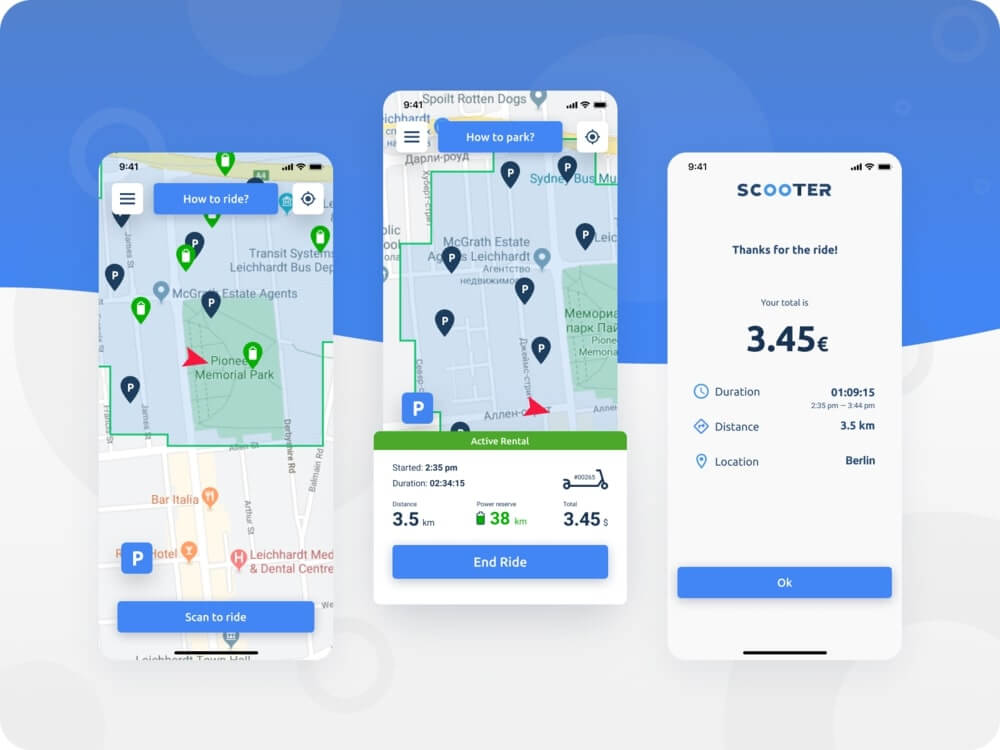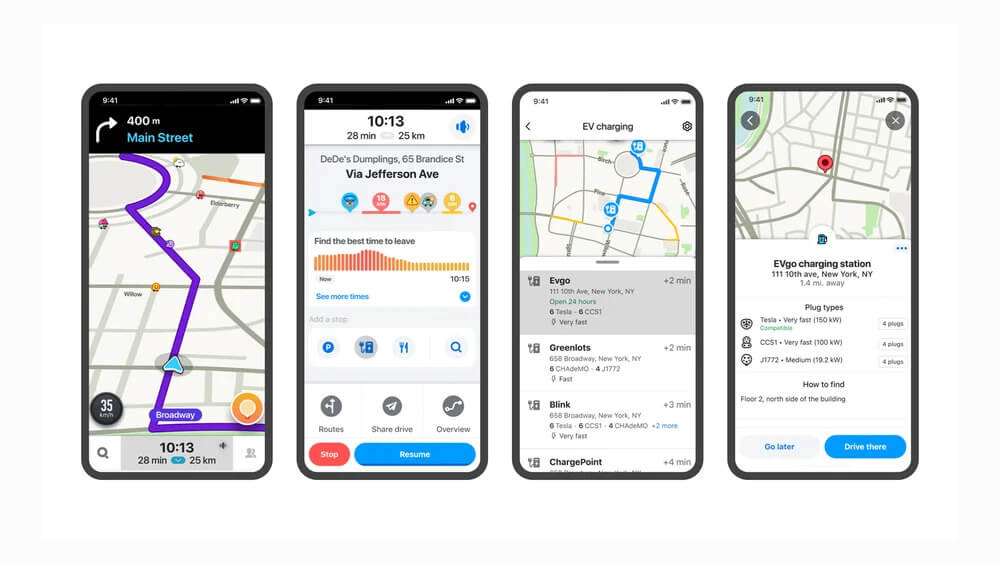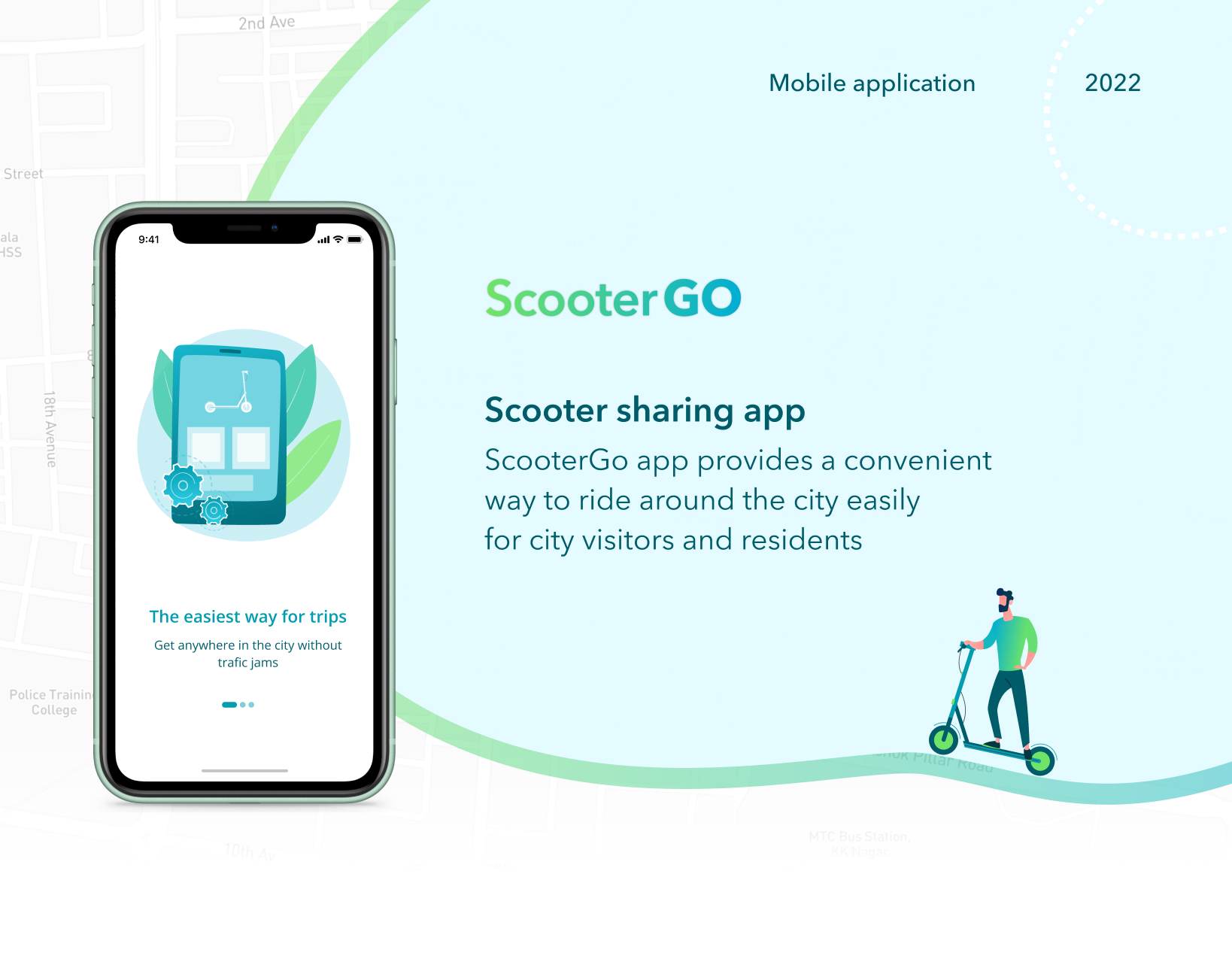Month: April 2023
Useful APIs for Micromobility Business
What are micromobility APIs?
APIs, or Application Programming Interfaces, are rules, protocols, and tools for building software applications and integrating third-party solutions. They allow different software systems to communicate, enabling developers to access functionality or data from other applications, services, or platforms.
You can use APIs internally, for example, to connect databases to your application or link multiple applications together.
APIs aren’t just beneficial; they’re absolutely essential in modern application development
External or third-party APIs are used to access data and communicate with apps and services outside of your application. In this article, we’ll talk about the most valuable external APIs for micromobility applications.
With these APIs, you’ll get a functional application that benefits from third-party services for payments, mapping, traffic management, and IoT functionality.
Benefits of APIs in micromobility app development
Easy integrations
The first and most important reason to use micromobility APIs is of course the ease of integration. Instead of building something from scratch, you can just integrate your app with another service and get access to its functionality.
Without this, each time you create an app, you’d need to build your own maps or a payment system. As you can imagine, this would be impossible.
Increased efficiency
Using APIs significantly decreases the time and effort required for developing software. They allow developers to reuse existing code and functionality, so they don’t need to build complex systems from scratch.
Scalability
With APIs, you can integrate cloud-based systems that will help you handle high traffic by distributing workloads across multiple servers. This will allow you to expand your business regarding users and connected vehicles.
Flexibility
Your developers have countless services they can choose from, regardless of the programming language, platform, and operating system.
Innovation
APIs give developers more freedom and flexibility to create something unique on top of existing solutions and are widely available to all kinds of applications. They can also combine services to create functionality that would otherwise be impossible.
As you can see, APIs aren’t just beneficial; they’re absolutely essential in modern development. Let’s talk about the best APIs you can use for your micromobility software.
We’ll start with general APIs that can be used in any ride-sharing software regardless of type. Then, we’ll discuss examples of car rental APIs, bike share APIs, and scooter share APIs.
Best APIs for micromobility
Mapping APIs
Google Maps API
This widely-used mapping service gives developers access to Google’s extensive mapping data. With Google Maps APIs, you can embed maps and location-based features in your micromobility app, such as directions, geocoding, and place search. The API provides free and paid access options depending on usage volume and required features.

Mapbox
Mapbox is a platform that provides customizable mapping tools and location data. It offers a range of APIs, including mapping, navigation, geocoding, and tools for creating custom maps and visualizations. Mapbox also provides a mobile SDK for iOS and Android development.
OpenStreetMap
This is a crowd-sourced mapping platform with a vast database of location data. OSM is free and provides access to detailed, up-to-date mapping data. Developers can contribute to the OSM community by adding or updating mapping data.
Payment APIs
Stripe, PayPal, Braintree
All these payment processors work in most countries worldwide and provide fast and secure online payments. Each platform offers a range of payment options and features, such as fraud prevention, subscription management, and support for multiple currencies.
Stripe offers the broadest range of payment options and currencies out of these three payment APIs.
Google/Apple Pay
These mobile payment platforms allow users to make online payments using their Android or iOS devices. The APIs provide features such as fraud prevention, transaction management, and support for multiple payment methods, including credit and debit cards. Both services provide mobile SDKs for Android and iOS development.
Note that you can integrate a local payment API if you don’t operate internationally. The choice of a payment platform depends on its fees and your business needs.
IoT APIs
AWS IoT
This cloud-based platform provides tools and services for connecting, managing, and securing IoT devices. Its API allows developers to interact with IoT devices and manage device data in the cloud. The API provides device shadowing, management, and secure communication features. AWS IoT also provides tools for data analytics and visualization.
Google Cloud IoT
This API helps developers manage and interact with IoT devices in micromobility. Google Cloud API provides features such as device registry, device telemetry, and integration with Google Cloud services. Data analytics and visualization will provide you with valuable insights that are easy to read and interpret.
Azure IoT
Microsoft’s IoT API has features such as device provisioning, device management, and more. For micromobility specifically, Azure IoT offers real-time tracking, predictive maintenance, data analytics, security, and integration with other Azure services.
Weather APIs
OpenWeatherMap
This popular weather data provider offers a comprehensive set of APIs for accessing real-time and historical weather data. For micromobility apps, this service offers a range of weather maps and widgets that can be integrated into micromobility apps, allowing users to see weather conditions at a glance.
Weather Underground
This API provider can give your micromobility app users detailed and localized weather information, including current conditions, hourly forecasts, and severe weather alerts. With this information, your app can suggest the best routes based on weather conditions. Weather Underground also offers a range of weather visualizations and radar maps that can be integrated into micromobility apps.
AccuWeather
This data provider gives lots of API options for hourly forecasts, radar maps, and weather alerts. AccuWeather offers a range of weather visualizations and widgets and other features like weather-based pricing and routing.
Traffic APIs
TomTom
TomTom is a mapping and navigation data provider you can integrate into your micromobility app to provide users with real-time traffic data, road closures, and alternative routes, destinations, and directions.
Waze

This popular tool offers a range of APIs for accessing real-time traffic and location data. You can use Waze for real-time traffic data, including traffic jams, accidents, and road closures. Waze also offers social features allowing users to share information about traffic and road conditions with others.
Push notifications
Twilio
This popular cloud communications platform offers a range of APIs for sending and receiving SMS, voice, and video messages, as well as push notifications. You can use Twilio to send push notifications to users’ mobile devices, providing them with real-time updates about the status of their rides, such as when their ride is ready, when their driver is on the way, or when their ride has arrived.
Firebase Cloud Messaging
This messaging service by Google enables developers to send push notifications to iOS, Android, and web apps. Just like Twilio, it can be used at any stage of your users’ ride and notify them of any status changes, additional information, special offers, etc.
Car sharing APIs
Here are the best car rental API integrations you can add to your app for car sharing and car rental.
CarTrawler API
You can use this API in your car sharing app to help your users search for and compare car rental options from multiple providers, including traditional rental car companies and peer-to-peer car-sharing platforms.
OpenChargeMap API
This is an open-source car rental API that can be used to find electric vehicle charging stations, which is especially useful for electric car-sharing platforms.
Vehicle API
This framework by Google provides access to a range of vehicle-related data, such as vehicle speed, engine RPM, and fuel level. With this API, your car-sharing app can communicate with a car’s hardware, providing users with real-time information about the car’s performance and condition.
OBD-II API
This API provides access to data from a car’s On-Board Diagnostics (OBD) system. This can include information such as fuel efficiency, engine performance, and other metrics that you can use to monitor the condition of your fleet and optimize its performance.
Also, all companies that provide IoT devices for cars and other vehicles usually offer REST APIs and mobile SDKs that allow you to communicate with your fleet. Here are some examples of such companies:
- Geotab
- Fleet Complete
- Invers
- Teltonika
- Smartcar
- Tantalum
Bike and scooter sharing APIs
Bikes, scooters, and mopeds usually use similar hardware that allows them to connect with software. IoT modules for these vehicles can provide a variety of data, such as location, speed, and other vehicle metrics, which you can use to optimize fleet performance and improve efficiency. Let’s look at APIs perfect for bike and electric scooter app development.
IoT Hub API
This API provides device-to-cloud and cloud-to-device communication services, making it ideal for integrating hardware components of a scooter or bike-sharing system.
MQTT API
This messaging protocol is designed for the Internet of Things and can be used to communicate between hardware devices and the cloud in a scooter or bike-sharing system.
Particle API
This API provides a cloud platform for managing and controlling connected hardware devices, including scooters and bikes.
Sigfox API
This API is a low-power wide-area network protocol that can be used for long-range communication between hardware devices in a scooter or bike-sharing system.
NFC API
You can use this API to enable the Near Field Communication (NFC) capabilities in a scooter or bike-sharing system, allowing your users to unlock and access the shared vehicles easily.
Many companies provide hardware like IoT modules for bikes and scooters. These companies usually offer APIs and modules to connect them with software.
Let me give you an example of such APIs from Teltonika — a telematics company that creates IoT modules for vehicles like cars, trucks, bikes, scooters, buses, etc.
Teltonika’s APIs
FMB Protocol API
This RESTful API provides access to the data generated by Teltonika’s FMB (Flexible Mobile/Modular Board) devices, including location data, sensor data, and other vehicle-related metrics. You can use this API to integrate FMB devices with third-party software and systems, enabling real-time tracking and monitoring of vehicles.
TAVL API
The Teltonika Automatic Vehicle Location (TAVL) API gives you access to real-time location data generated by Teltonika’s IoT modules. TAVL is a software platform that provides fleet management and vehicle tracking capabilities. Use this API to integrate TAVL data with your car, scooter, or bike-sharing app.
SDK/API for Bluetooth
Teltonika offers an SDK/API for Bluetooth that can be used to develop custom applications for Bluetooth-enabled devices. This API can be used to create custom applications that interact with Teltonika’s IoT modules, enabling real-time tracking and monitoring of vehicles.
How Mobindustry can help you build micromobility software
We at Mobindustry have experience in building micromobility apps for scooters, bikes, and cars, as well as other IoT applications. We offer custom development along with our own white-label scooter-sharing solution called ScooterGO.

ScooterGO is a great high-quality white-label rideshare app for scooters that you can customize to your business needs and branding. You get a quick start in the scooter-sharing business with a single, one-time payment.
With our solution, you’ll never get stuck because it’s designed for your success: our microservice-based architecture makes ScooterGO easy to scale and develop further.

We’re a software development company first, so if you need any changes to this solution, we can provide you with anything you need, from IT consulting and business analysis to development, testing, and maintenance.
If you’re planning to build a micromobility business, look no further. We’ll help you at every stage of your business development, including branding, design, and hardware recommendations. Contact us for an initial consultation, and we’ll find a perfect solution.

